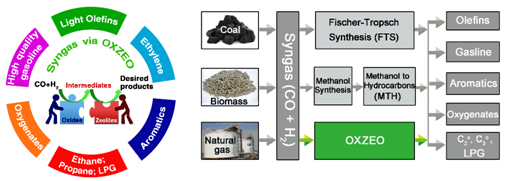-
Chinese researchers OXZEO process significantly improves alkene chemical precursors production from coal
Date posted:
-
-
-
Post Author
Greg Kelsall
-
-

Chinese scientists claim to have made significant advancements in the production of short chain alkenes derived from coal, which could yield substantial economic benefits, and have far-reaching implications for the country’s energy and resource security.
The research has centred on alkenes (also called olefins), a class of chemical compounds that serve as important precursors in the production of various industrial products such as plastics, pharmaceuticals and cosmetics. Alkene production including ethylene, propylene and butylene has traditionally relied on petroleum as the feedstock, but synthesising them from coal involves a more complex process. Chinese researchers said they were able to double the yield of the previous international record, according to a paper published in the peer-reviewed journal Science in May 2023. By harnessing a new synthesis technique, the research team said it was able to produce a light-olefin yield of 48%, significantly higher than the previously confirmed yield of less than 27%.
The research dates back to 2016, when a research team led by Professor Pan Xiulian and academic Bao Xinhe from the Dalian Institute of Chemical Physics first proposed a new synthesis technique known as OXZEO. This method used a composite catalyst system that separated the decomposition of the reactants from the formation of products. By separating these two processes, the reaction efficiency is significantly increased. Following another seven years of research, the team was able to improve the catalyst system, which not only promoted the reaction rate, but also suppressed the occurrence of side reactions. While maintaining a selectivity of more than 80% for light olefins, the catalyst has now achieved a conversion rate of 85% for carbon monoxide.
China’s ethylene industry has seen significant development in recent years. In 2019, China’s ethylene production capacity surpassed Europe for the first time. In 2022, China became the world’s largest producer of ethylene, when its production capacity of almost 50 million tonnes surpassed that of the USA, which recorded 43.3 million tonnes for the year.
“Most ethylene production has used petroleum as a direct raw material. But for China, which is rich in coal but lacks petroleum resources, technology that converts coal to ethylene is strategically significant,” said an analyst with the China National Petroleum Corporation in the Chinese journal International Petroleum Economics. “Once scaled up, the technology could reduce China’s dependence on petroleum in chemical production,” he said.
In 2020, in collaboration with industry partners, the DICP completed an industrial pilot test that could produce 1,000 tonnes of olefins per year. Now that the reaction yield has been doubled, it is expected that industrial applications will be further accelerated.

